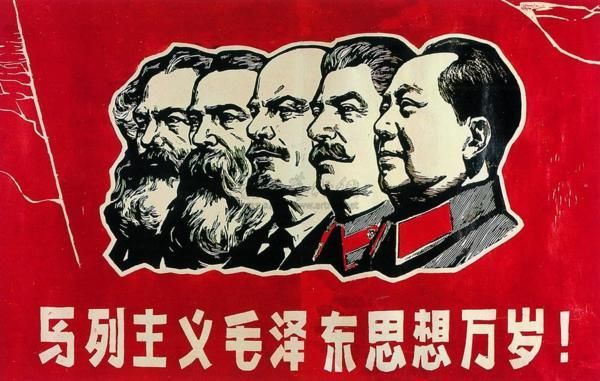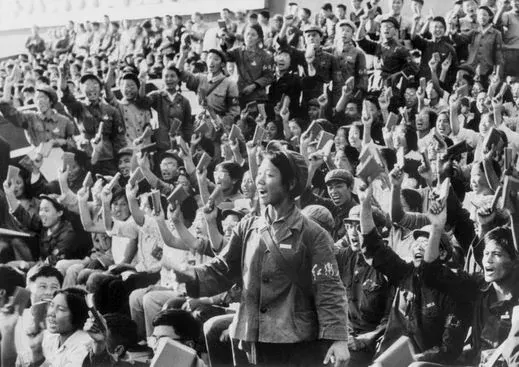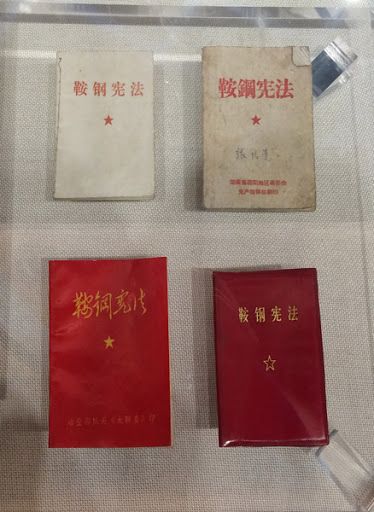Criticizing the Limitations of Maoism (Part 1)
Text/Magic Yiji
Correction/Fries Fries
Maoism clearly pointed out the problem of capitalist restoration and put forward the theory of continuing the revolution. This was indeed a big step forward on the basis of Leninism, but in the end it was only an improvement of Leninism. Since the introduction of Maoism, people's attention has been focused on preventing the restoration of capitalism, and the focus has been on preventing capitalist-roader bureaucrats. It is strange, however, that the Maoists always think of limiting the bureaucracy under the bureaucracy, rather than eliminating it. This is the limitation of Maoism - the failure to escape the influence of Leninism.

Mao hoped to fight the capitalist-roader bureaucracy by giving the masses political freedom. This is seeing only the mass superstructure part of the superstructure, ignoring the state superstructure part of the superstructure. The superstructure is divided into two parts, state institutions and mass organizations. The former, however, is the main aspect of the contradiction, which is dominant in the superstructure sphere. Under the bureaucratic dictatorship, the state power has unlimited rights, the army, the police, etc., it is impossible for mass organizations to fight against it. In the first three years of the Cultural Revolution, the reason why the mass organizations were able to compete with the capitalist-roader bureaucrats to a certain extent was because of the support of the Central Cultural Revolution headed by Mao. Nevertheless, in the first three years when the rebels were at their strongest, they were repeatedly attacked by the bureaucracy and the army. A blow from the conservative Red Guards. (50 Days of White Terror, Conservatives and Capitalist Roaders Red Guards attacked frantically, Red Guards persecuted rebels together with local Party committees and conservatives from February to March 1967, Wuhan July 20th Incident, Guangxi Massacre, Investigating May 16, 1 Fighting against the three evils...) Even in these three years, the rebels often did not have the upper hand. In the next seven years, the rebels had almost no rights. If it weren't for Mao's repeated orders to withdraw the working group, order the army to support the left, forbid the army to suppress the masses, and not listen to the suppression of the rebels by the bureaucratic capitalist roaders, the army, and the protectionist Red Guards, it can be said that the rebels would have been in the first three years. It was completely wiped out, and it could even be said that the Cultural Revolution could not be launched at all. In 50 days, the White Terror slandered all the revolutionary leftists as rightists, just like the anti-rightist and the Four Cleansing Movements did. Therefore, it is impossible to rely on mass organizations to stop bureaucratic corruption under the bureaucracy. Even if the chairman is a revolutionary, there is no medium to stop the bureaucracy. If the chairman is not a revolutionary, then these mass organizations will obviously be bloody suppressed and completely destroyed (exposing, criticizing, cleaning up three types of people), and it is even less likely to achieve the effect of cracking down on the bureaucracy and thus preventing the restoration of capitalism.

Therefore, it is impossible to expect to confront the bureaucracy under the bureaucratic dictatorship. Many of our comrades are very troubled. How can we fight against the capitalist-roader bureaucracy? In fact, you shouldn't be thinking in this direction at all.
Why is there a bureaucracy? Because of the dictatorship of the Political Bureau of the Central Committee. Therefore, if we want to solve the problem, we must implement a democratic system, so that there will be no bureaucratic groups at all.
Of course, the root of capitalist restoration lies in capitalist legal rights. To completely eliminate the possibility of a restoration of capitalism, it is necessary to completely transform the economic base of capitalism into that of socialism, because it is the economic base of capitalism that determines the superstructure. Because of the existence of a capitalist economic base, it is possible to change the socialist superstructure into a capitalist superstructure compatible with the capitalist economic base, that is, to initiate a bourgeois restoration. Only by eliminating the feudal legal rights and the economic basis of feudalism (the economic basis is the relations of production) can we achieve the present capitalist society without any danger of restoration of feudalism (because the economic basis has been completely transformed into capital of feudalism, but not of feudalism).
However, it will take tens or hundreds of years to gradually restrict and completely eliminate capitalist legal rights. In these tens or hundreds of years, it is enough for the restoration of capitalism. We all know that there is a limit to capitalist legal rights, which of course always has to be limited and is constantly being reduced and eliminated. The question is how do we ensure that capitalism is not restored while limiting the legal rights of capitalism in these tens or hundreds of years.
The bureaucracy is the part of the interrelationship between people in the relations of production and the double vestiges of capitalism in the government apparatus in the superstructure. He will infinitely expand the capitalist legal rights that can be suppressed before, and expand the communist factor that can surpass the development of the socialist society, and eventually lead to the restoration of capitalism.
The three components of production relations, namely ownership, distribution, and the status and relationship between people in production, will affect each other. Once in a socialist public-owned enterprise, the factory manager and cadres become corrupted and become capitalist roaders, deducting the surplus value of workers, and controlling, carding, pressing, deducting, beating, scolding the proletariat, etc., then the ownership of the enterprise will essentially change. became capitalist ownership. The cadre bureaucracy squeezes the surplus value of workers and obtains privileges. In essence, the distribution model has changed from socialist distribution according to work to capitalist distribution according to ownership of means of production. This example shows that wherever there is a capitalist interpersonal relationship (bureaucracy), it acts on the ownership and distribution model, transforming the socialist ownership and the socialist distribution model into a capitalist ownership and a capitalist model of distribution. distribution mode.
The capitalist bureaucrats in the superstructure have already used their power for personal gain, corruption and bribery, and extracting the residual value of the people. They are no longer distributed according to labor, but distributed according to ownership (that is, all bureaucrats receive the surplus value of the whole country according to their ranks. Before the restoration, this will be suppressed, and after the restoration, it will completely become bureaucratic monopoly capitalism ).
Here, in the production relations and the superstructure, the leading cadres in the state-owned enterprises and the bureaucrats in the superstructure echo each other, interact and promote each other. The leading cadre in the enterprise is afraid of proletarian resistance and needs the superstructure, the bureaucracy in the Chinese state apparatus, the army, the police to suppress the masses, and also the bureaucracy to protect his position in the power struggle. The bureaucrats also need corporate cadres to bribe him, directly give him a portion of the corporate profits, or withhold a portion of the residual value handed over by various companies to him to get rich. The leading cadres in the oil supply enterprises naturally hope that the capitalist roaders will become more and more powerful, and it is best to launch the restoration of capitalism, because these people are their representatives of interests in the superstructure. The capitalist roaders also hope that more corporate leaders will become corrupt and degenerate in order to obtain more profits, and it is best that they all become capitalist enterprises in order to obtain maximum benefits for themselves. The ownership there had better become capitalist ownership, the distribution had better become the capitalist distribution model, and the status and relationship between people in production had better become capitalist. (like bureaucracy)
That is to say, the economic base, the bureaucracy in the relations of production determines the superstructure, and the bureaucracy in the superstructure reacts on the economic base. As we have analyzed above, the corporate bureaucracy represents capitalism in the economic base, and the bureaucracy in the superstructure represents capitalism in the superstructure. That is to say, the essence here is that capitalist relations of production strengthen the capitalism of the superstructure. Capitalism in the superstructure works in reverse to strengthen capitalism in the economic base. When the economic base of capitalism is so strong that it feels that the socialist superstructure can no longer fit with it (because the socialist government apparatus will suppress the capitalist roaders), the superstructure is decided. That is, to change the superstructure of socialism into the superstructure of capitalism is to launch the restoration of capitalism. After the restoration, the capitalist superstructure requires that the socialist production relations, which are no longer suitable for it, be changed into capitalist production relations. That is, through the division of land to households, socialist collective ownership has been transformed into capitalist private ownership, and socialist public ownership has been transformed into bureaucratic monopoly through the reform of state-owned enterprises, capitalism and private capitalism.
The Anshan Iron and Steel Constitution is an attempt to eliminate capitalist legal rights in production relations, but it has not been implemented. Why is this? This question is a bit like asking why the Revolutionary Committee has not achieved true democratic elections. Revolutionary committees cannot achieve true democratic elections because the party has always had a strong influence. After the establishment of the revolutionary committees, the party soon took the leading position in the various revolutionary committees.

And the party in turn occupied a dominant position in various enterprises. Since the party wants to direct everything and obey the party, it is naturally impossible to implement real democracy in the enterprise, so it is impossible to implement the Ansteel Constitution.
The metamorphosis of the Revolutionary Committee is essentially that the capitalist legal power (party, bureaucracy) in the superstructure prevents the socialist superstructure. The failure to implement the Ansteel Constitution is essentially the capitalist legal rights in the superstructure and the economic base, which together prevent the development of the socialist economic base.
In fact, even if the Revolutionary Committee implemented democracy, and the Angang Constitution was implemented, they would soon be defeated by the bureaucracy. (Refer to the previous analysis of the Cultural Revolution)
That is to say, as long as the bureaucracy remains in the economic base and superstructure, any improvement is useless. First, it is impossible to implement this kind of improvement, and secondly, even if it is implemented, it will soon be destroyed again by the bureaucracy.
Therefore, we can see that the original panorama of capitalist law is a little bit left in the relations of production, which can certainly lead to the emergence of a small number of new bourgeoisie. However, if a democratic system is implemented (the superstructure of socialism), the masses of the people can immediately replace and punish such a small number of leading cadres of capitalist enterprises through the superstructure of socialism, and the proletariat can directly dismiss them in the enterprise through the democratic system ( i.e. the socialist system in the relations of production). Due to the remnants of capitalist legal rights in the relations of production, there will also be a very small number of capitalist roaders in the superstructure as representatives of their interests, but the proletariat can punish them through the replacement of supervision by the democratic system.
Like my work? Don't forget to support and clap, let me know that you are with me on the road of creation. Keep this enthusiasm together!
